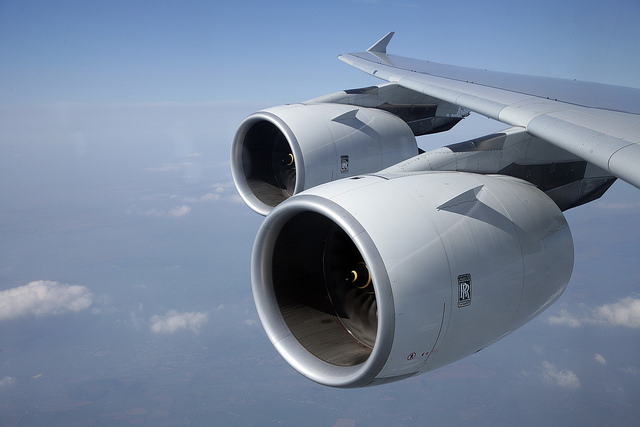Military
Airlines Industry Wants to Get Tough With Engine, Aircraft Makers
Published:
Last Updated:

What they did not hear, at least officially, was further discussion of the dispute between the three U.S. legacy carriers and the three largest Middle East airlines related to the “open skies” agreements that the U.S. airlines say are being violated by government subsidies to the Middle East carriers.
IATA director general/CEO Tony Tyler noted that the overall trend for the industry is “upwards” and that 2015 revenues are forecast at $727 billion with profits of $29.3 billion, a margin of about 4%. While the margin remains thin, Tyler said that for the first time in the group’s history, “the industry as a whole is earning its cost of capital.” Passenger fares have dropped 64% over the past 20 years and the carriers are expected to acquire 1,700 new planes with a value of $180 billion in 2015 alone.
ALSO READ: Boeing Downplays 777 Production Cut
On the last point, Willie Walsh, CEO of International Consolidated Airlines Group, which is the parent of British Airways, warned that the carriers must challenge the “restrictive practices” of suppliers or remain “captive” as costs threaten to escalate “well in excess [of] anything that is justified.” Compared with the 4% margins the industry commands, suppliers typically enjoy double-digit margins, according to The Wall Street Journal. Walsh said that he has asked the IATA to hire legal counsel to explore the issue.
Of particular concern is the limitation on engine choice for new aircraft. The Airbus A330neo will use a Rolls-Royce engine exclusively and the 777X from Boeing Co. (NYSE: BA) is slated to use only the GE9X engine from General Electric Co. (NYSE: GE). Earlier versions of these aircraft offered options.
GE’s aviation division chief responded that high development costs make it difficult for engine makers to offer those choices. The president of Airbus said, “The competition with Boeing is very tough and this is why we are the only two guys in town.”
From the carriers’ point of view, though, it probably looks like engine makers are staying out of one another’s way by focusing on a single engine for a single plane. Even more aggravating for the carriers are the required maintenance contracts that are very lucrative for engine makers.
As for Boeing and Airbus and their huge backlogs of orders, building new passenger jets is difficult. Bombardier’s troubles with its C-Series and China’s Comac are proof enough of that. Last month Comac announced a further delay into next year on the first test flight of its C919 narrow-body passenger jet. The C919 service date was originally set for 2016, but earlier delays pushed that date out to at least 2018, and the most recent delay could push deliveries out to 2020.
ALSO READ: Are Airline Stocks Becoming Grossly Oversold?
Start by taking a quick retirement quiz from SmartAsset that will match you with up to 3 financial advisors that serve your area and beyond in 5 minutes, or less.
Each advisor has been vetted by SmartAsset and is held to a fiduciary standard to act in your best interests.
Here’s how it works:
1. Answer SmartAsset advisor match quiz
2. Review your pre-screened matches at your leisure. Check out the advisors’ profiles.
3. Speak with advisors at no cost to you. Have an introductory call on the phone or introduction in person and choose whom to work with in the future
Get started right here.
Thank you for reading! Have some feedback for us?
Contact the 24/7 Wall St. editorial team.